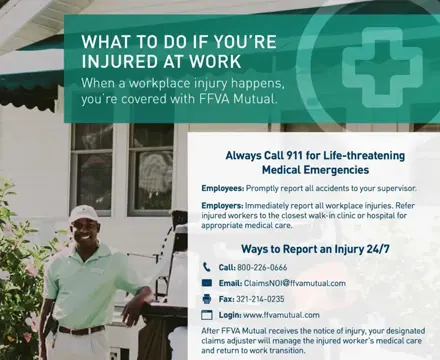Understanding Workers’ Compensation
Navigating workers’ comp shouldn’t be a headache waiting to happen. Whether you’re an employee curious about your medical benefits or an employer reviewing your business insurance, understanding how workers’ compensation works is crucial for everyone in professional fields.
What is Workers’ Compensation, and Why is it Important?
At its core, workers’ compensation is a form of insurance that provides benefits like medical care and disability coverage to employees who sustain workplace injuries. But it’s not solely for the worker’s benefit; it’s also a vital element of responsible business insurance.
For business owners, the stakes are high. Workers’ compensation minimizes legal disputes by setting the terms for settlement between injured workers and employers. This system helps maintain a safer working environment, laying out protocols for incidents ranging from minor injuries to severe accidents. It’s worth noting that the cost of negligence isn’t trivial. Consider this: Lost-time workers’ compensation claims due to motor-vehicle crashes average a staggering $85,311 per claim. Other high-cost claims stem from burns ($54,173), falls or slips ($48,575) and getting caught in machinery ($44,588).
Employees also have a vested interest in understanding workers’ comp. Beyond the immediate need for medical treatment following an injury, workers’ compensation provides a longer-term financial cushion through disability benefits, covering lost wages and additional medical expenses. In simpler terms, it ensures that an injured employee doesn’t have to choose between getting appropriate medical care and paying the bills.
It’s essential to note that workers’ compensation laws aren’t uniform across the board, though — they vary from state to state. This means both employers and employees need to be aware of their specific state’s regulations, such as those outlined by the North Carolina Industrial Commission or the Georgia State Board of Workers’ Compensation, to fully understand their rights and responsibilities under the law.
The Purpose and Benefits of Workers’ Compensation
So, you understand that workers’ comp is crucial, but what specifically does it aim to accomplish? The objectives are twofold: providing a safety net for both employees and employers.
Financial support during the recovery from an injury is often the first thing people associate with workers’ compensation benefits. And rightly so. When an employee faces a work-related injury, workers’ comp kicks in to cover immediate medical expenses such as emergency room care, diagnostic studies, hospital stays, etc. Additionally, workers’ comp insurance also covers any necessary ongoing medical treatment — enabling the injured worker to focus on recovery without the stress of looming medical bills.
That said, the benefits do go beyond medical costs into some things that are even more invaluable, like job security. The system is designed to facilitate a smooth return to work. This could mean vocational rehabilitation programs or even workforce development opportunities tailored to accommodate any new physical limitations. Thus, not only does workers’ comp cover the period of disability with light-duty assignments, but it aims to restore the injured employee to functional capacity in the professional sphere.
And in the most unfortunate scenarios where a workplace injury leads to a fatality, workers’ compensation provides death benefits for grieving families. Under legal guidelines, beneficiaries are eligible to receive weekly cash benefits. These payments are calculated to be two-thirds of the average weekly earnings of the deceased worker, based on their income for the 52 weeks leading up to the incident.
Calculating Workers’ Compensation Benefits
If you find yourself asking “How does workers’ compensation work?” and you’re aiming to decipher the costs associated with workers’ compensation, you’ll need to look beyond the surface. Several variables come into play, each affecting your premium in unique ways. Here’s the lowdown:
- Workers’ Class Codes: Numerical identifiers assigned by the National Council on Compensation Insurance (NCCI). They categorize the type of work an employee performs. Riskier jobs lead to higher class code rates and, thus, higher premiums.
- Number of Employees: More people on the payroll usually mean higher insurance costs. However, a good safety record can counterbalance this, leading to potential discounts.
- Payroll: The total payroll helps the insurance company estimate the number of hours employees are exposed to risk. A higher payroll generally equates to higher premiums.
- Claims History: This is expressed as an experience modification rating – a numerical value reflecting past injuries and their associated costs. A higher modifier raises your premium, while a lower one can reduce it.
Now, how do you combine these factors? The basic formula for workers’ comp premiums generally looks like this:
Workers class code rate x claims experience modifier x (payroll/100)
Assume a class code rate of $3.81 for an electrical contractor job with an annual payroll of $507,507, a clerical payroll rate of 0.15 and an annual payroll of $41,000. The calculation would be:
Class 5190 Electrical: $3.81 x $507,507 = $19,336
Class 8810 Clerical: 0.15 x $41,000 = $62
Add to get the total annual premium = $19,398
1,000,000/1,000,000/1,000,000 limits – 1.4% x $19,398 = $272 in additional charges for limits higher than the basic 100/500/100.
Add to get the subject premium = $19,670
In this example, the annual workers’ compensation premium would be $19,670. If the insured has a drug-free or safety program in place, they will receive a 5% credit for remaining drug free and a 2% credit for safety. For example, here is what a safety credit would calculate out to:
Safety Credit: 2% x $19,670 = $393 credit
Subtract to get the unmodified premium = $19,277
When calculating the claims experience modifier, a MOD of 1.00 is basic, while anything over would incur an additional charge and anything under would provide the insured with some credit.
For a MOD of 0.84, the calculation would be: 0.84 x $19,277 = $16,193
Here, the MOD reduced the premium with a $3,084 credit, whereas a MOD exceeding 1.00 would incur an additional charge.
With a standard premium of $16,193 multiplied by a premium discount of 3.84%, they receive an additional $564 credit, which leaves $15,629.
The expense constant will depend on the insured’s specific state. In Florida, for example, it’s $160. Finally, the Terrorism Act includes a required 1% fee for each policy which, in this case, equals $55:
$15629 + $160 + $55 =a final total policy premium of $15,844
Eligibility and Coverage
Now, let’s dig into the fine print. Some things to take into consideration are the following:
- Employee Classification: Before assuming your workers are automatically eligible for compensation, double-check their employment status. Independent contractors and gig workers usually don’t fall under the workers’ compensation umbrella.
- Mandatory Coverage: If you’re operating in a state like Florida, having up-to-date workers’ compensation insurance is a legal obligation. Make sure your policy is compliant and current to avoid legal entanglements.
- Injury Context: Picture this: An employee slips and falls at a company-sponsored picnic. It may be a company event, but since the injury didn’t occur during the course of regular work duties, it’s typically not covered by workers’ compensation. Given that an estimated 12,000 American workers are injured daily, the lines between what’s compensable and what’s not need to be crystal clear for everyone involved.
- Timelines for Reporting and Filing: When an injury occurs, the countdown begins. Both you and the injured employee have specific deadlines for reporting the incident and filing a claim. In Florida, the employee must report the injury to you within 30 days, and you have seven days from the time of notification to report it to your insurance carrier. Missing these can result in the employee’s disqualification from benefits and potential repercussions for your business.
- Claim Approval: Simply submitting a claim doesn’t guarantee its approval, and fraud is a serious issue. Be careful not to exaggerate claims or be misleading, as your insurance provider will exercise due diligence to verify its legitimacy.
The Importance of Return-to-Work Programs
Now it’s time to pivot toward proactive strategies — enter return to work (RTW) programs. For employers, implementing a robust RTW program is a multifaceted strategy with tangible benefits. They can help you by:
- Accelerating Employee Recovery: A structured RTW program sends a signal to the entire workforce that the company is invested in employee welfare. This has cascading effects. Colleagues who witness the organization’s support are more likely to feel engaged, fostering a culture of trust and commitment that’s crucial for any high-functioning team.
- Boosting Morale: The ripple effect of a well-managed RTW program can electrify an entire workforce. When employees see that their well-being is a corporate priority, it builds a culture of mutual respect and dedication.
- Saving Costs: Think about it this way: Every day an employee is out, the company absorbs the cost of their absence in addition to their temporary replacement. By accelerating the return to work, you mitigate these costs, ultimately leading to substantial long-term financial benefits.
- Maintaining Legal Compliance: Being compliant instills confidence among stakeholders, including employees, and can even offer a competitive edge in the market. Plus, non-compliance can lead to increased scrutiny, and once you’re on a regulator’s radar, it can be a long and costly process to get off it.
- Reducing Turnover: The average cost to replace an employee can range from one-half to two times the employee’s annual salary, and that doesn’t even account for the lost institutional knowledge. RTW programs can be a strong anchor, encouraging long-term commitment from your employees.
- Retaining Skilled Talent: The expertise that resides with your long-standing employees isn’t easily replaceable. When an injured employee knows they have a place in the company and a clear path back to their role, those skills and critical institutional knowledge remain in-house.
Common Myths and Misconceptions about Workers’ Compensation
Muddled thinking and misconceptions surrounding workers’ compensation can create real barriers. For employers keen on maintaining a healthy, transparent work environment, and for employees who should know their rights, misconceptions can lead to costly mistakes or missed opportunities. Let’s cut through the noise and address these myths head-on.
Your Employer will Help You Get the Maximum Benefits
The reality here is nuanced. While many employers genuinely want the best for their employees, the workers’ compensation system doesn’t function solely based on goodwill. A business owner’s primary concern is often to manage liability and control insurance costs. As a result, don’t rely solely on your employer to guide you toward the maximum benefit—seek expert advice and know your rights under the law.
The “Deviation from Procedure” Misconception
Some employers incorrectly believe that if an employee deviates from the trained procedures and sustains an injury, they won’t be eligible for benefits. The law is not that black and white. While procedures and guidelines are set for safety, deviations don’t automatically disqualify an injured worker from receiving benefits. The focus is often on whether the injury occurred in the course of employment.
The “Minor Injury, No Claim” Misbelief
Many employees think that a minor injury isn’t worth filing a claim for, but even minor injuries can develop into significant medical issues over time. Any workplace injury, no matter how small, should be reported and documented.
An Employee Could be Laid Off for Filing a Workers’ Compensation Claim
This myth is a genuine fear among many employees, but it’s largely unfounded. Laws exist to protect workers from being terminated solely for filing a workers’ compensation claim. Employers who retaliate in this manner could find themselves in legal hot water.
Additional resources from FFVA Mutual
It’s important to get the most from your workers’ comp policy and our Solutionists are here to help!
Got questions? We have answers. Our experts are ready to guide you through any safety or workers’ comp issue. Equip yourself with the knowledge you need to succeed.
Are you a Florida employer? View this post to learn more about Florida workers’ comp insurance.
Discover what makes FFVA Mutual Different!






























